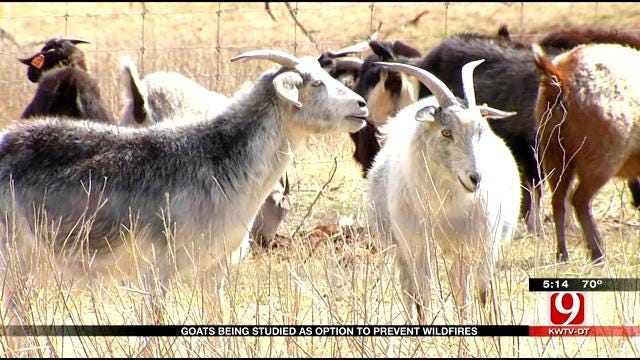Researchers Study Goats As Option For Controlling Fires
There are different options when trying to control brush to prevent these fires, but what about goats taking a bite out of the problem?Friday, March 14th 2014, 6:43 pm
There are different options when trying to control brush to prevent these fires, but what about goats taking a bite out of the problem?
Researchers at Langston University have been studying goats for 25 years and how they eat through some dangerously dry areas.
"Goats just love certain trees and take them out in a year," Steve Hart, researcher at Langston University, said.
It's an easy day job; goats at work while out to lunch. For hours, about 1,500 goats graze 160 acres at Langston University.
"You just have to be patient and give the goat time, and they will chew it up and make a clear area for you," Hart said.
Over time, goats completely eat out thick and dry brush and trees like red cedars, which have oil that acts like diesel and explodes in a fire.
Logan County has battled a number of grassfires so far this year, and while these grazers aren't the most popular brush-control system, they are a profitable one.
1/13/2014 Related Story: Logan County Residents Survey Grass Fire Damage
"When they're used for controlling brush, they don't cost you anything," added Hart. "Actually, goats are profitable while they are controlling brush, so you can convert your brush into a saleable product then and do it a profit."
Scientists hope that more people will start to see goats as one of nature's best resources.
"One to two goats acre is a good start for controlling brush and weeds," said Hart. "It may take more if you have a real dense stand of brush and weeds, and when you look at Oklahoma and all the red cedar around, we could support literally tens of thousands of goats here in Oklahoma on our red cedar."
The American Institute for Goat Research at Langston University is in the process of submitting a grant worth $600,000 to further study goats controlling red cedars.
More Like This
March 14th, 2014
November 13th, 2024
October 28th, 2024
Top Headlines
March 14th, 2025
March 14th, 2025










